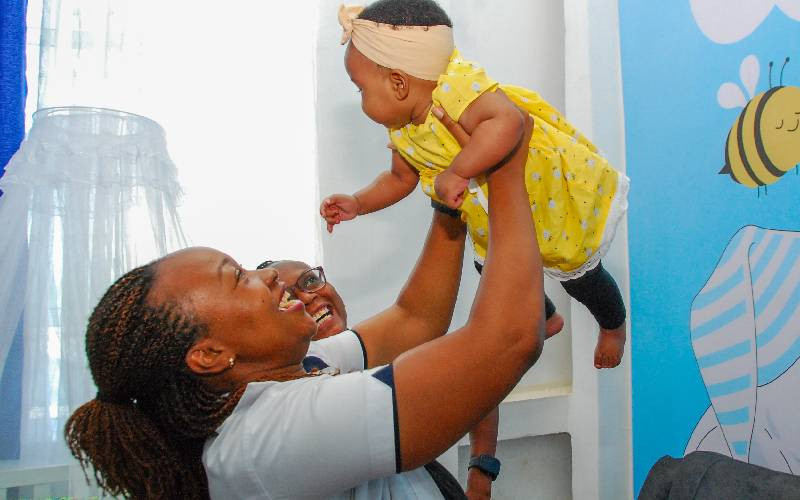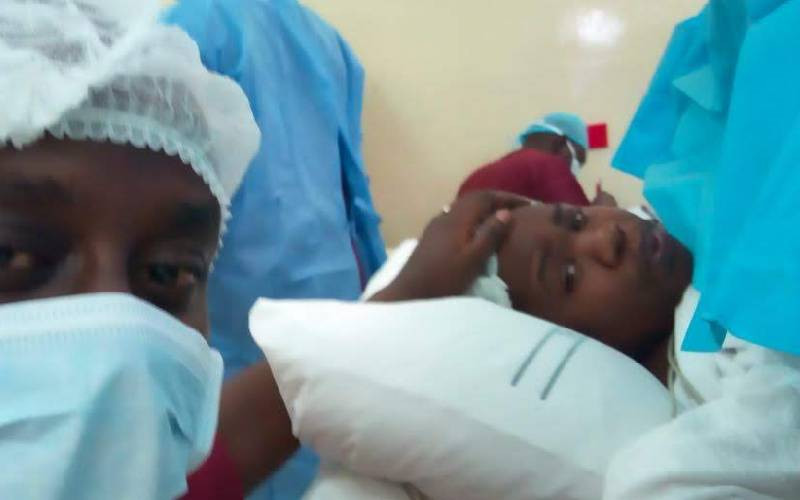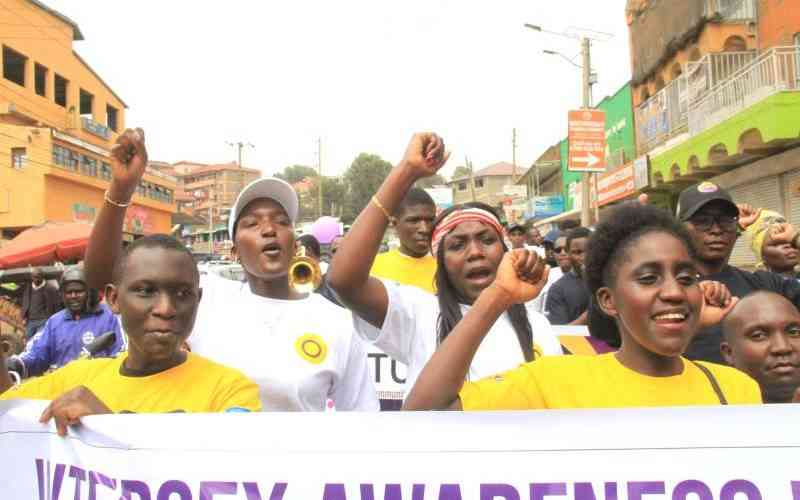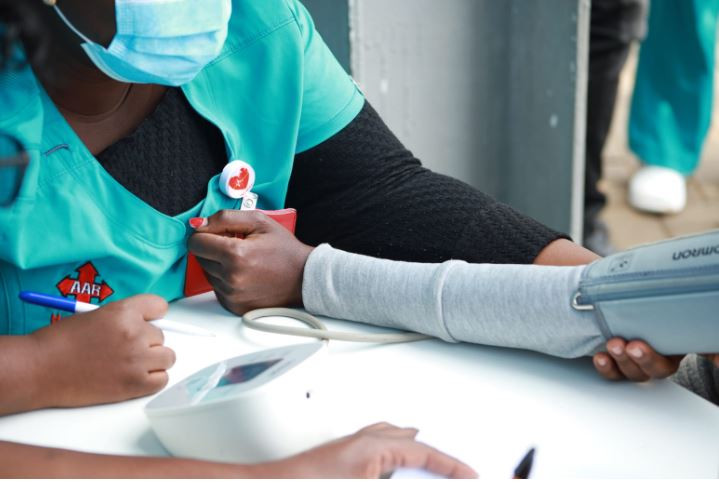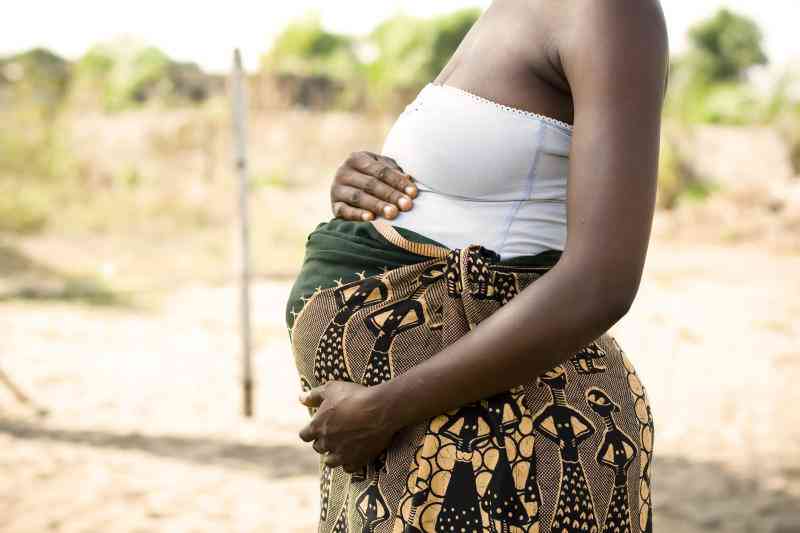
When Nelpha Oroo got her period in 2019 while in Form Two, she had never imagined that menstrual periods came with pain.
"When I went to shower as usual after waking up, I found huge blood stains in my pants. I was not shocked to see that because I already knew that this was a sign that I had started my monthly period. What no one told me was that periods sometimes came with pain and at first, I was very angry about that," narrates Nelpha, now 21 and a second-year student at Rongo University.
While she was excited about 'becoming a woman', it was difficult to ignore the numbing back and lower belly pains. And as if that wasn't enough, her nipples were, annoyingly, so tender, that she didn't want anyone near her in case someone accidentally brushed against them.
At first, she took some over-the-counter painkillers, believing it would help but after a few hours, the painkillers had not worked.
"I was so disappointed because the debilitating pain in my back was still there. The best way to describe the pain is the feeling of being stabbed continuously with a knife," Nelpha narrates. "I didn't know what else to do so I decided to wait until the next day but I was still in pain," she recalls.
Eventually, mood swings, irritability and food cravings kicked in but the pain stood out as the most worrying issue. After two to three days of feeling the same way, Nelpha opened up to her mother who decided that they would seek medical attention. She too was worried about why her daughter was going through that pain.
A gynaecologist at the hospital they visited told Nelpha that her pain was known as dysmenorrhea -- severe and frequent menstrual cramps and pain during a woman's menstrual period.
According to the American College of Obstetricians and Gynecologists (ACOG), more than half of the women who menstruate have some pain for 1 to 2 days each month. Usually, the pain is mild but for some women, the pain is so severe that keeps them from doing their normal activities for several days a month.
- Uterine growths can give you bad shape and cause kidney failure
- How fibroids deny many women motherhood
- Lupita's battle with fibroids: What every woman should know
Keep Reading
"In Kenya, we are not sure how many people are suffering from this condition but, globally 50-90 per cent of women have dysmenorrhea if not throughout their lives, it's during their reproductive age. It is quite significant and it's something that needs to be addressed," says Dr Sauda Farooqui an obstetrician-gynaecologist at the Nairobi West Hospital.
"For some women, severe pain comes with other symptoms including abnormal bleeding, painful sex, vagina infection, headache, nausea, diarrhoea and dizziness," explains Dr Farooqui.
According to ACOG, there are two types of dysmenorrhea; primary and secondary.
Under primary dysmenorrhea, the cramping pain comes before or during a period. It's caused by natural chemicals called prostaglandins that are made in the lining of the uterus.
Prostaglandins cause the muscles and blood vessels of the uterus to contract. On the first day of a period, the level of prostaglandins is high. As bleeding continues and the lining of the uterus is shed, the level goes down. This is why pain tends to lessen after a few days of a period.
Secondary dysmenorrhea is caused by a disorder in the reproductive organs. The pain tends to get worse over time and it often lasts longer than normal menstrual cramps. For example, the pain may begin a few days before a period starts. The pain may get worse as the period continues and may not go away after it ends.

According to Dr Farooqui, some of the conditions that can cause secondary dysmenorrhea include endometriosis. Endometriosis happens when tissue similar to the lining of the uterus grows in other areas of the body, such as on the ovaries and fallopian tubes, behind the uterus, and on the bladder.
Like the lining of the uterus, this tissue breaks down and bleeds in response to changes in hormones. This bleeding can cause pain, especially around the time of a period.
Another condition that causes secondary dysmenorrhea is fibroids. These are growths that form on the outside, on the inside, or in the walls of the uterus. Fibroids located in the wall of the uterus can cause painful cramps. However, small fibroids usually do not cause pain.
Having problems with the uterus, fallopian tubes, and other reproductive organs - certain defects that a woman is born with - can result in pain during menstruation hence dysmenorrhea.
Dysmenorrhea also maybe be genetic, coming out of nowhere like in the case of primary dysmenorrhea.
"Women with primary dysmenorrhea have abnormal contractions of the uterus due to a chemical imbalance in the body. For example, the chemical prostaglandin which controls the contractions of the uterus," Dr Farooqui says.
Nelpha has been living with this menstrual condition for four years now and it has not been easy for her.
"I used to experience painful periods for one week, but years later, it reduced to 2-3 days but this did not reduce the discomfort as the pain was still there and so intense," Nelpha says.
She add that her menstrual cycle also become quite irregular, making things even more difficult as she was never able to predict when she would be in pain.
"I would get my period on the 12th day of my cycle then the next time, they would come on the 27th day," Nelpha says.
"I felt so unlucky. I became a source of problems for my friends. Mood swings and irritability were also a large issue. Whenever I was on my period, I would lose interest life," Nelpha says.
She adds that she would become so hostile even to her closest friend to the point that they would distance themselves from her -- especially those who didn't understand the pain she went through every month.
"I don't like how this condition affects my social life. I can't concentrate in class when I'm on my periods, especially during examinations. Imagine losing total concentration when a lecturer is passing some important information to students. It's quite discouraging," Nelpha says.
"I always lose appetite. I can't stand for long and can't walk normally when I have this so-called dysmenorrhea. What worries me most is that I none of my friends have the same symptoms. Sometimes I ask myself how I was born," she laments.
"If there was a way I could postpone my period, I would do so every month. I get my period every month but it seems I will never get used to it. When I know I'm about to have my period, I become so stressed and my mood changes," Nelpha narrates.

Nelpha has been to several hospitals in search of an expert who can offer a solution to her problem but the medics she has seen only advise her to use painkillers to sort out the pain. Unfortunately, even the strongest painkillers she has access to have stopped working and she is worried about the effects of using painkillers long term.
Another thing that bothers her is the general notion that, as a woman, she must bear the pain and stop looking for shortcuts.
Dr Farooqui says that there is help available for women who experience dysmenorrhea and they should seek help from medical professionals.
"There's a statement from people that as a woman you must suffer for it. No, there's always a solution since we can control the pain. Suffering a lot of pain doesn't make you a woman so seek help and a gynaecologist can see how to help you," Dr Farooqui says adding that there needs to be more advocacy and awareness for dysmenorrhea.
"We have a percentage of women and girls with this condition but there may be more who are suffering quietly and are not coming to hospital because of the lack of awareness. As a nation and concerned stakeholders, let's talk to experts and raise awareness on social media as we see in the United Kingdom," Dr Farooqui says. She explains that, especially with secondary dysmenorrhea, there are solutions.
"For example, if it's caused by fibroids, a gynaecologist can perform surgery to remove the growths. If it's endometriosis, treatment can be done or proper painkillers can be prescribed," Dr Farooqui says.
According to ACOG, medications are usually the first step in treating painful periods. Certain pain relievers target prostaglandins. These medications called Nonsteroidal Anti-inflammatory Drugs (NSAIDs) reduce the prostaglandins made by the body and lessen their effects. This in turn makes the menstrual cramps less severe.
Nelpha says that her experience has opened her eyes to the need to create awareness about the condition.
"It needs a multi-sectorial approach. All stakeholders including researchers, doctors, patients, and public and private partners should be involved," Nelpha says. "Many women are suffering in silence since so many are told that is normal," she says.
 The Standard Group Plc is a multi-media organization with investments in media
platforms spanning newspaper print
operations, television, radio broadcasting, digital and online services. The
Standard Group is recognized as a
leading multi-media house in Kenya with a key influence in matters of national
and international interest.
The Standard Group Plc is a multi-media organization with investments in media
platforms spanning newspaper print
operations, television, radio broadcasting, digital and online services. The
Standard Group is recognized as a
leading multi-media house in Kenya with a key influence in matters of national
and international interest.


